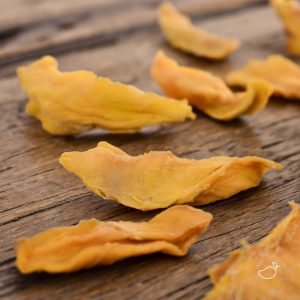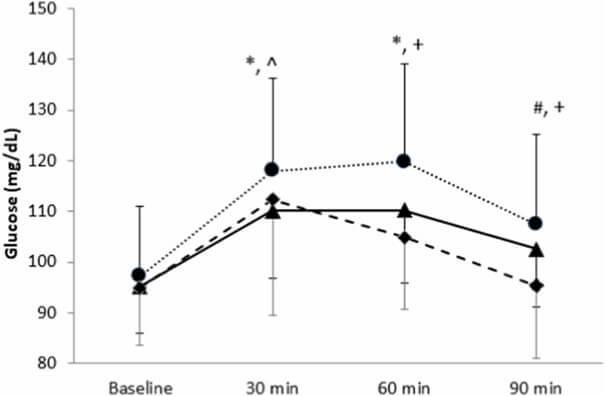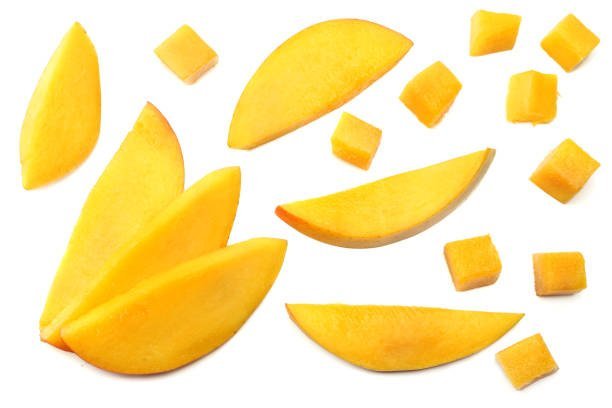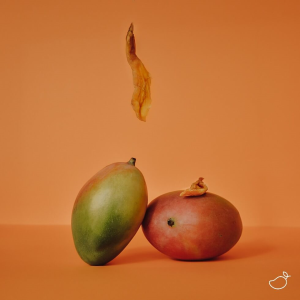Is dried mango healthy? Everything you need to know!
Dried mango is the most popular of the dried tropical fruits and its consumption is growing rapidly. So it’s good to find out; how healthy is dried mango?
We discuss the nutrients in dried mango, the effects on blood sugar levels and everything there is to know about the health effects of dried mango.
We only base findings that are scientifically substantiated. For feedback or input on this article, please contact us at info@driedmango.co.uk.

What is the effect of dried mango on blood sugar levels?
One of the most promising aspects of dried mango as an alternative snack is its effect on blood sugar levels. It’s no secret that sugary snacks can have a significant impact on blood sugar levels, which can lead to long-term health problems like diabetes. However, dried mango without extra added sugar offers a healthier choice.
Several studies have shown that the glycemic index (GI) of dried mango is relatively low compared to other sweet snacks. The GI is a measure of how quickly carbohydrates in a food are broken down and raise blood sugar levels. A low GI means that dried mango raises blood sugar levels more slowly and steadily, which is beneficial for people who want to limit their sugar intake.
There will be in 2023 research done on the effect of dried mango on blood sugar levels. The effect of dried mango on blood sugar levels was compared with that of fresh mango and white bread. The peak for both fresh and dried mango is considerably lower than that for white bread. With fresh mango, glucose decreases in the blood faster than dried mango. If the comparison is made with, for example, sweets containing refined sugars instead of white bread, the difference will probably be even greater, but this has not been investigated.

The graph above shows the blood sugar level of white bread (the ball), fresh mango (the diamond) and dried mango (the triangle). Both dried and fresh mango show a lower peak. (*study link)
Lots of fiber in dried mango and blood sugar levels
The study indicates that the lower spike in blood sugar levels can be attributed to the high amount of dietary fiber in both fresh and dried mango. Fiber is not broken down into glucose by the small intestine as is the case with other carbohydrates. It passes undigested to the large intestine, where it is fermented by intestinal bacteria. For that reason, it does not lead to high glucose levels compared to foods that have easily digestible carbohydrates (such as white bread, pasta, noodles or other processed foods).
We have extra fiber-rich dried mango, you can mention this when placing your order in our webshop and we will ensure that you receive the specific variety!
Mangiferin in dried mango and its effect on blood sugar levels
Another reason for the more limited impact on blood sugar levels of both fresh and dried mango could be the presence of mangiferin, according to the study. This is a bioactive substance that is believed to reduce glucose levels and insulin resistance. Mangiferin is an inhibitor of glucosidase, enzymes responsible for the breakdown of carbohydrates. Therefore, mangiferin could prevent a large amount of carbohydrates from being converted into glucose and absorbed in the intestine. There are in-depth studies on this 1 en 2.
Spikes in blood sugar levels cause your body to produce insulin to remove glucose from the bloodstream and into the cells as energy. This reduces your blood sugar level, which you experience as a sugar dip.
It is normal for your blood sugar level to fluctuate and does not have to be unhealthy. It is better to avoid major peaks and valleys. A stable blood sugar level has an effect on:
- Preventing strong feelings of hunger;
- A healthy weight
- Preventing energy dips
- A lower risk of insulin resistance and type 2 diabetes
- Reduced risk of cardiovascular disease and several other diseases such as dementia.
Vitamins in dried mango
Dried mango contains a large number of vitamines and each of these vitamins has specific health benefits. Here are some of the most important vitamins in dried mango and what they are good for:
- Vitamin A: Dried mango is particularly rich in vitamin A, often in the form of beta-carotene. Vitamin A is essential for healthy skin, healthy eyes, and a properly functioning immune system. It also plays a role in growth and development. (3)
- Vitamin C: Vitamin C is a powerful antioxidant that helps fight free radicals in the body, which can help reduce inflammation and strengthen the immune system. It also plays a role in the formation of collagen, which is important for skin, bone and joint health. (4)
- Vitamin E: Vitamin E is another antioxidant that helps protect cells from oxidative damage. It can also help maintain healthy skin and improve the immune system.
- Vitamin K: Dried mango also contains a small amount of vitamin K, which plays a role in blood clotting and bone health.
- Vitamin B-complex: Dried mango contains some B vitamins, including B1 (thiamine), B2 (riboflavin), B3 (niacin), B5 (pantothenic acid) and B6 (pyridoxine). These vitamins are essential for metabolism, energy production and maintaining a healthy nervous system.
- Potassium: Potassium is a mineral that is important for the regulation of blood pressure, muscle function and maintaining electrolyte balance in the body.
- Copper: Copper is a trace element necessary for the formation of red blood cells, the functioning of the nervous system and the production of collagen for healthy skin.
It is important to note that the amount of these vitamins in dried mango can vary depending on factors such as the ripeness of the mango and the drying method. Look here for the specific nutritional value of our mango. Overall, however, dried mango is a healthy addition to your diet and provides you with important nutrients. They can help meet the daily requirement of vitamins and minerals.
Antioxidants in dried mango
Dried mango contains several antioxidants, which are essential for fighting free radicals and promoting overall health. Some of the most important antioxidants in dried mango are:
- Beta-carotin: This is a precursor to vitamin A, and it gives dried mango its characteristic orange color. Beta-carotene is a powerful antioxidant that helps neutralize free radicals in the body. It plays an important role in maintaining healthy skin, improving vision and supporting the immune system.
- Vitamin C: Although previously mentioned as a vitamin, vitamin C is also an antioxidant. It helps protect the body against oxidative stress and plays a crucial role in immune function.
- Flavonoids: Dried mango contains several types of flavonoids, such as quercetin, isoquercitrin, astragalin and kaempferol. These antioxidants can reduce inflammation, protect blood vessels and contribute to heart health.
- Polyfenols: Polyphenols are a group of antioxidants found in many plant foods. They have several health benefits, including reducing inflammation and protecting cells from free radical damage.
These antioxidants in dried mango help protect the body against harmful effects of oxidative stress, which are linked to aging and the development of chronic diseases. Regularly consuming foods rich in antioxidants can contribute to a healthier lifestyle and reduce the risk of certain conditions.
However, it is important to note that the exact amount of antioxidants in dried mango can vary depending on factors such as the variety of mango, its ripeness at harvest, and processing methods. Overall, dried mango remains a tasty and nutritious source of antioxidants that can be a valuable addition to a healthy diet.

How many calories are in Dried Mango?
The number of calories per 100 grams of dried mango is 268 kcal, or 1,138 kJ. Is that a lot? It is similar to dried fig and slightly less than there is in dried apricots or dried dates. It is important to say that there are many types of mango and the degree of ripeness of the mango influences this. If you are specifically looking for dried mango with fewer calories, we have a higher fiber variety that contains approximately 10% fewer calories, please mention this when placing your order. our webshop and we’ll make sure you get that variety!
How much sugar is in Dried Mango?
100 grams of dried mango contains approximately 57 grams of sugar. This is dried mango to which no extra sugar has been added, so it is unsweetened. The candied dried mango contains 68 grams of sugar, but the main difference is that refined cane sugar has been added. The sugared version is more comparable to conventional candy and is not healthy. All the dried mango we sell in onze webshop is unsweetened. Naturally dried mango without extra added sugar also has the property that the sugars are released more slowly and the blood sugar level remains more stable (read more above).
Is dried mango good for you? Conclusion!
In conclusion, dried mango is a healthy snack option due to its high content of fiber, vitamins, minerals and antioxidants. Not only does it provide a natural and tasty alternative to sugary snacks, but it also provides overall health benefits. Its fiber content supports healthy digestion and helps with feelings of satiety, making it an excellent choice for weight management. In addition, it provides important vitamins, minerals and antioxidants that promote the skin, immune system and general health. With its combination of sweetness and nutritional value, dried mango is a tempting and nutritious choice for those looking for an alternative to traditional sweet snacks.



